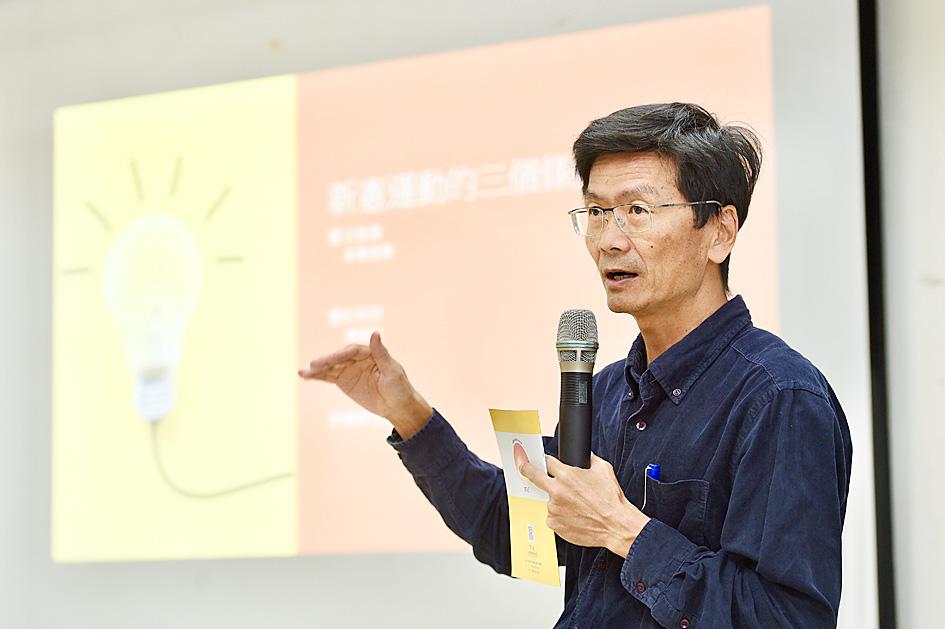If the nation is to ratify a new constitution, it must first end any illusions about the current document’s relevance to Taiwan, an academic told a forum in Taipei yesterday.
For the constitutional revisionist movement to succeed, it needs public enthusiasm, the right timing and a clear plan of action, Chung Yuan Christian University associate professor Hsu Wei-chun (徐偉群) told attendees at the event titled “Imagining a New Constitution for a New Era,” which was organized by the National Taiwan University Graduate Student Association.
The Constitution exists under the “one China” framework and has little relevance to Taiwan, Hsu said, adding that there have been calls to rewrite it for more than 40 years, but such social movements take time.

Photo: Peter Lo, Taipei Times
As a constitution is a highly political document that is deeply connected to a nation’s character, it must be considered when diagnosing political ailments and when imagining what kind of a country its people wish to have, he said.
Therefore, Taiwanese must become familiar with the Constitution, but at present, it is disconnected from people’s daily lives, he said, adding that if people truly want a new nation, drafting a new constitution is imperative.
Hsu said that reformers should focus on two key aspects: the Constitution’s “one China” framework and transforming governance.
Considering Taiwan’s precarious status, the “one China” framework is intertwined with Chinese aggression, yet has little to do with Taiwan itself, he said, adding that drafting a new Constitution could help the nation diagnose its political challenges and implement reform.
However, most important is how Taiwanese view their relationship with China, Hsu said.
For example, Hsu said that he still has students who think that the Shanxi and Yunnan provinces are part of the Republic of China, so to illustrate the problem, he asks them how the government should tackle crime in those regions.
Breaking this illusion of affiliation is difficult, but as Chinese aggression rises, so does Taiwanese consciousness, he said.
People’s lives have become more connected to this land, Hsu said, adding that he is optimistic about the future, as Taiwanese would have the chance to decide for themselves.
Hsu, who also serves on the executive committee of the Civil Alliance to Promote Constitutional Reform, has twice before participated in constitutional reform movements.
During the Sunflower movement, Hsu petitioned to convene a constitutional convention. After the 2016 presidential election, the alliance proposed four priorities for constitutional reform: lowering the voting age to 18, lowering the threshold for constitutional referendums, reforming the apportionment of legislator-at-large seats and revising the human rights clause.

The Ministry of Education (MOE) is to launch a new program to encourage international students to stay in Taiwan and explore job opportunities here after graduation, Deputy Minister of Education Yeh Ping-cheng (葉丙成) said on Friday. The government would provide full scholarships for international students to further their studies for two years in Taiwan, so those who want to pursue a master’s degree can consider applying for the program, he said. The fields included are science, technology, engineering, mathematics, semiconductors and finance, Yeh added. The program, called “Intense 2+2,” would also assist international students who completed the two years of further studies in

Former president Tsai Ing-wen (蔡英文) departed for Europe on Friday night, with planned stops in Lithuania and Denmark. Tsai arrived at Taiwan Taoyuan International Airport on Friday night, but did not speak to reporters before departing. Tsai wrote on social media later that the purpose of the trip was to reaffirm the commitment of Taiwanese to working with democratic allies to promote regional security and stability, upholding freedom and democracy, and defending their homeland. She also expressed hope that through joint efforts, Taiwan and Europe would continue to be partners building up economic resilience on the global stage. The former president was to first

Former president Tsai Ing-wen (蔡英文) on Monday called for greater cooperation between Taiwan, Lithuania and the EU to counter threats to information security, including attacks on undersea cables and other critical infrastructure. In a speech at Vilnius University in the Lithuanian capital, Tsai highlighted recent incidents in which vital undersea cables — essential for cross-border data transmission — were severed in the Taiwan Strait and the Baltic Sea over the past year. Taiwanese authorities suspect Chinese sabotage in the incidents near Taiwan’s waters, while EU leaders have said Russia is the likely culprit behind similar breaches in the Baltic. “Taiwan and our European

The Taipei District Court sentenced babysitters Liu Tsai-hsuan (劉彩萱) and Liu Jou-lin (劉若琳) to life and 18 years in prison respectively today for causing the death of a one-year-old boy in December 2023. The Taipei District Prosecutors’ Office said that Liu Tsai-hsuan was entrusted with the care of a one-year-old boy, nicknamed Kai Kai (剴剴), in August 2023 by the Child Welfare League Foundation. From Sept. 1 to Dec. 23 that year, she and her sister Liu Jou-lin allegedly committed acts of abuse against the boy, who was rushed to the hospital with severe injuries on Dec. 24, 2023, but did not